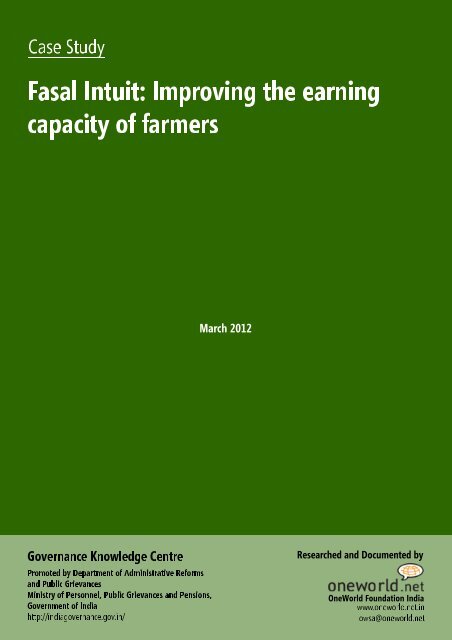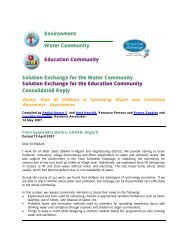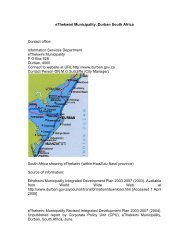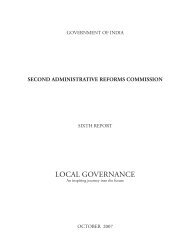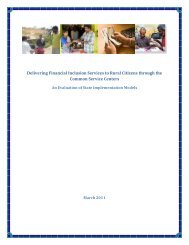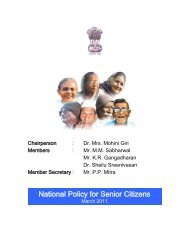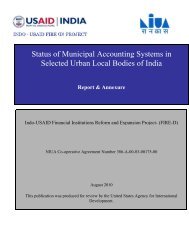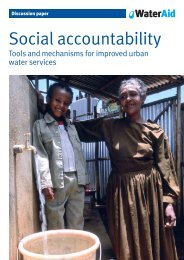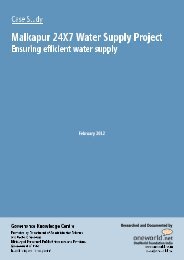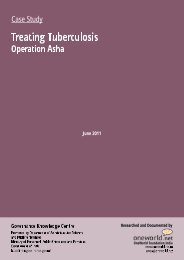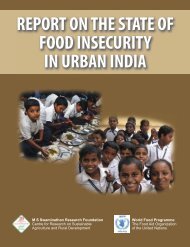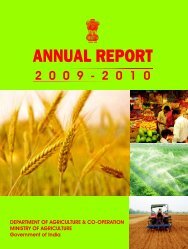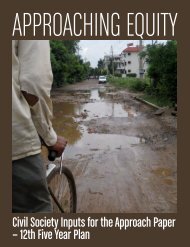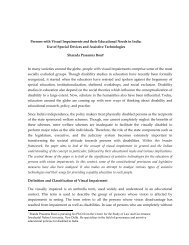See full case study - Indiagovernance.gov.in
See full case study - Indiagovernance.gov.in
See full case study - Indiagovernance.gov.in
You also want an ePaper? Increase the reach of your titles
YUMPU automatically turns print PDFs into web optimized ePapers that Google loves.
FasalIntuit:Improv<strong>in</strong>gtheearn<strong>in</strong>gcapacityoffarmersMarch2012GovernanceKnowledgeCentrePromotedbyDepartmentofAdm<strong>in</strong>istrativeReformsandPublicGrievancesM<strong>in</strong>istryofPersonnel,PublicGrievancesandPensions,GovernmentofIndiahtp:/<strong>in</strong>dia<strong>gov</strong>ernance.<strong>gov</strong>.<strong>in</strong>/ResearchedandDocumentedbyOneWorldFoundationIndiawww.oneworld.net.<strong>in</strong>owsa@oneworld.net
Governance Knowledge CentrePromoted by Department of Adm<strong>in</strong>istrative Reforms and Public GrievancesM<strong>in</strong>istry of Personnel, Public Grievances and Pensions, Government of IndiaTransparency and AccountabilityCase StudyAgricultureFasal Intuit, March 2012Table of ContentsExecutive Summary .................................................................................................................................. 2Methodology ................................................................................................................................3Background ................................................................................................................................3Objective ................................................................................................................................4Project Design ................................................................................................................................4Key Stakeholders............................................................................................................................................................. 4Work<strong>in</strong>g Design .............................................................................................................................. 5Information Flow ................................................................................................................................5F<strong>in</strong>ancial Model ................................................................................................................................7Achievements ................................................................................................................................7Challenges <strong>in</strong> Implementation ................................................................................................8Conclusion ................................................................................................................................9References ................................................................................................................................9Researched and documented by1OneWorld Foundation India
Governance Knowledge CentrePromoted by Department of Adm<strong>in</strong>istrative Reforms and Public GrievancesM<strong>in</strong>istry of Personnel, Public Grievances and Pensions, Government of IndiaTransparency and AccountabilityCase StudyAgricultureFasal Intuit, March 2012Executive SummaryTraditionally, the majority of farmers <strong>in</strong> India access <strong>gov</strong>ernment adm<strong>in</strong>istered mandis tosell/market their produce. These mandis were <strong>in</strong>itially encouraged to ensure fair prices, timelypayments and m<strong>in</strong>imum transaction cost for farmers. Nevertheless, these farmers cont<strong>in</strong>ue tosuffer from <strong>in</strong>efficient auction system and <strong>in</strong>adequate dissem<strong>in</strong>ation of market <strong>in</strong>telligence.Most rema<strong>in</strong> unaware of prevail<strong>in</strong>g market prices till they visit the mandi. Further, to save thetransportation costs, they travel only to the closest market <strong>in</strong>stead of explor<strong>in</strong>g prices <strong>in</strong> otheraccessible markets. In the worst <strong>case</strong>, farmers are forced to sell locally at the village level at amuch lower price.While the <strong>gov</strong>ernment has made several efforts to strengthen the agricultural sector andenhance opportunities for the Indian farmers, agricultural productivity and market<strong>in</strong>g are yetto reach its potential.To improve farmers’ access to <strong>in</strong>formation, thereby <strong>in</strong>creas<strong>in</strong>g their barga<strong>in</strong><strong>in</strong>g power <strong>in</strong> themarket, <strong>in</strong> 2008 the Global Bus<strong>in</strong>ess Division team at Intuit conceived Fasal, a simple yetcomprehensive solution for farmers. Fasal is a free SMS-based service that connects ruralfarmers with buyers and provides them with real-time price <strong>in</strong>formation. Farmers cansubscribe to this service by call<strong>in</strong>g the toll-free number 1800 102 8767, and provide detailsregard<strong>in</strong>g the crop, agricultural land and mandis visited, to enable dissem<strong>in</strong>ation ofpersonalised <strong>in</strong>formation. The mobile technology then uses a patented algorithm to match thefarmers with potential buyers.The success of the model lies <strong>in</strong> its use of local language, personalised <strong>in</strong>formation and f<strong>in</strong>ancialsusta<strong>in</strong>ability. ility. Studies <strong>in</strong>dicate that Fasal has helped farmers <strong>in</strong>crease their <strong>in</strong>come by 15 to 20percent (Rs. 15,000 p.a.) because of the improved access to timely <strong>in</strong>formation. As of March2012, more than 800,000 farmers are benefit<strong>in</strong>g from this service <strong>in</strong> Andhra Pradesh, Gujaratand Karnataka. The model is also known as Agr<strong>in</strong>ova and Fasal amongst local farmers. Moreand more farmers are enlist<strong>in</strong>g for this service. By help<strong>in</strong>g farmers earn more, Fasal is br<strong>in</strong>g<strong>in</strong>gabout a change <strong>in</strong> lives of Indian farmers. Fasal has far reach<strong>in</strong>g implications <strong>in</strong> India.This <strong>case</strong> <strong>study</strong> <strong>in</strong>tends to highlight the benefits of Fasal as an <strong>in</strong>novative <strong>in</strong>itiative thatfacilitates to enhance the condition of Indian farmers. It improves their access to favourableopportunities based on the creation and strengthen<strong>in</strong>g of market l<strong>in</strong>kages <strong>in</strong> rural India.Researched and documented by2OneWorld Foundation India
Governance Knowledge CentrePromoted by Department of Adm<strong>in</strong>istrative Reforms and Public GrievancesM<strong>in</strong>istry of Personnel, Public Grievances and Pensions, Government of IndiaTransparency and AccountabilityCase StudyAgricultureFasal Intuit, March 2012MethodologyThe Governance Knowledge Centre (GKC) research team conducts extensive research toidentify <strong>in</strong>itiatives that contribute towards the betterment of public service delivery <strong>in</strong> India.Fasal, with its focus on creat<strong>in</strong>g market l<strong>in</strong>kages and enhanc<strong>in</strong>g agricultural <strong>in</strong>come, show<strong>case</strong>sthe potential of improv<strong>in</strong>g farmers’ situation. Therefore, it was identified as a Best Practice forthe GKC.The document is based on the use of both, primary and secondary research methods. First,secondary resources available onl<strong>in</strong>e were referenced to <strong>study</strong> the agricultural scenario andassess the current situation of farmers <strong>in</strong> the country. Follow<strong>in</strong>g the background <strong>study</strong>, atelephonic <strong>in</strong>terview was conducted with the Director and Product Manager at Intuit toenhance understand<strong>in</strong>g about the product design, technological architecture andimplementation strategy and address related gaps.BackgroundAlthough the contribution of agriculture towards the Gross Domestic Product (GDP) hasplummeted over the years, it rema<strong>in</strong>s an important sector for the Indian economy as adom<strong>in</strong>ant part of the population is rural and dependent on agriculture as their primary sourceof livelihood. Many reforms have been <strong>in</strong>troduced by the <strong>gov</strong>ernment ent to boost agriculturalproductivity, improve supply cha<strong>in</strong> and enhance the <strong>in</strong>come of farmers however the challengesare immense and require jo<strong>in</strong>t efforts by the private sector, as well. Despite <strong>in</strong>creas<strong>in</strong>g prices ofagricultural commodities <strong>in</strong> urban areas, earn<strong>in</strong>gs of the farmers rema<strong>in</strong> low as the absence ofproper pric<strong>in</strong>g mechanism and access to timely market <strong>in</strong>formation makes them susceptible tofraud. Similar observations prompted Intuit’s team to explore the solutions for strengthen<strong>in</strong>gagricultural price transparency.In April 2009, Intuit, provider of bus<strong>in</strong>ess and f<strong>in</strong>ancial management solutions for small andmedium sized bus<strong>in</strong>esses, developed a mobile-based based agricultural <strong>in</strong>formation <strong>in</strong>novation thatdissem<strong>in</strong>ates <strong>in</strong>formation on price, weather and potential buyer to its subscribers. At first, themodel bears similarities to other <strong>in</strong>formation subscription programme that use mobile phonesto provide prevail<strong>in</strong>g market price and weather <strong>in</strong>formation to farmers. However, Fasal isdifferent <strong>in</strong> its bus<strong>in</strong>ess model as it is a free, yet personalised service for farmers that allowsmandi agents/large organisations/<strong>in</strong>stitutions to directly connect to the farmers with their prices,advisory services and relevant offer<strong>in</strong>gs.The idea of develop<strong>in</strong>g Fasal application was exhibited by the team when they visited ruralareas to <strong>study</strong> the problems faced by rural residents. The approach was motivated by Intuit’s3Researched and documented byOneWorld Foundation India
Governance Knowledge CentrePromoted by Department of Adm<strong>in</strong>istrative Reforms and Public GrievancesM<strong>in</strong>istry of Personnel, Public Grievances and Pensions, Government of IndiaTransparency and AccountabilityCase StudyAgricultureFasal Intuit, March 2012deep-rooted foundation <strong>in</strong> customer-driven <strong>in</strong>novation. It dedicates significant team resourcesto spend time with their customer to learn about their challenges, the ecosystems <strong>in</strong> which theyoperate and the solutions that impact their lives. Upon the completion of their <strong>study</strong>, Intuitrealised that there is a huge gap, as well as a demand for reliable and actionable data amongfarmers. 1 Be<strong>in</strong>g unaware of the best market price, farmers were compelled to take suboptimaldecisions while trad<strong>in</strong>g their produce. This <strong>in</strong>cluded sell<strong>in</strong>g locally for a lower price orthrow<strong>in</strong>g away spoiled crops that could not be sold <strong>in</strong> time.Further, it was identified that knowledge of potential buyers was also limited. As a result,Intuit pioneered an SMS based application platform ‘Fasal’ to success<strong>full</strong>y bridge the<strong>in</strong>formation gap between producers and buyers of agricultural commodities.ObjectiveThe key objective of Fasal is to empower farmers with necessary <strong>in</strong>formation to help them<strong>in</strong>crease their profit <strong>in</strong> the market. In addition, the SMS platform encourages l<strong>in</strong>kage betweenfarmers and buyers.Approximately 800,000 farmers are currently benefit<strong>in</strong>g from this service. Many farmers havethe access to mobile phones and can access the Fasal service directly.Project DesignKey StakeholdersIntuit, , primary stakeholder, is a US-based <strong>in</strong>formation technology company that designed,developed and implemented the Fasal programme <strong>in</strong> India.Farmers of Gujarat, Andhra Pradesh and Karnataka are currently the beneficiaries of theservice. Fasal service has allowed farmers to make important decisions related to market<strong>in</strong>gtheir produce.Buyers/advertisers, such as Mandi agents, <strong>in</strong>stitutions, organizations, benefit from Fasal as itenables them to reach out to farmers to buy produce or sell agricultural <strong>in</strong>puts.1 http://fasal.<strong>in</strong>tuit.com/about.htmlResearched and documented by4OneWorld Foundation India
Governance Knowledge CentrePromoted by Department of Adm<strong>in</strong>istrative Reforms and Public GrievancesM<strong>in</strong>istry of Personnel, Public Grievances and Pensions, Government of IndiaTransparency and AccountabilityCase StudyAgricultureFasal Intuit, March 2012Work<strong>in</strong>g DesignIntuit has followed a systematic approach to design and develop a susta<strong>in</strong>able bus<strong>in</strong>ess modelbased on the users’ needs. As an organization, prior to design<strong>in</strong>g any solution, Intuit <strong>in</strong>itiates“Follow Me Homes” programme – where team members engage with customers to understandthe problems they face <strong>in</strong> daily work-life. This stage works as a needs-assessment that enablesthe Intuit team to generate pragmatic solutions for their customers. For Fasal, the team spentmore than 100 hours of ‘Follow Me Homes’ learn<strong>in</strong>g about various bus<strong>in</strong>ess challenges fac<strong>in</strong>gagricultural market<strong>in</strong>g <strong>in</strong> India. Follow<strong>in</strong>g this stage, an SMS based <strong>in</strong>novation was developedto cater to the <strong>in</strong>terests of the dist<strong>in</strong>ct target groups.Figure 1: Information flow under Fasal IntuitInformation FlowA comprehensive, methodical process is used to ascerta<strong>in</strong> a farmer’s requirements, and alsoenlist buyers <strong>in</strong>to the system. Thereafter, a rigorous algorithm is applied to match the needs ofthe farmers with offer<strong>in</strong>gs of the buyers. The flow of <strong>in</strong>formation entails follow<strong>in</strong>g stages:1. A farmer contacts Intuit through a toll free number to register for the services. The callseek<strong>in</strong>gspecific <strong>in</strong>formation oncentre agent creates an account for the farmer by commodity grown, current crop season, land size under cultivation and usual marketsaccessed by the farmer. The farmer’s profile is mapped to the market, he visits to sell hisproduce.Researched and documented by5OneWorld Foundation India
Governance Knowledge CentrePromoted by Department of Adm<strong>in</strong>istrative Reforms and Public GrievancesM<strong>in</strong>istry of Personnel, Public Grievances and Pensions, Government of IndiaTransparency and AccountabilityCase StudyAgricultureFasal Intuit, March 20122. Fasal uses a complex and patented match<strong>in</strong>g algorithm based on farmers profile toidentify ify a potential buyer and provides buyer <strong>in</strong>formation to farmers through SMScreat<strong>in</strong>g an engaged and busy marketplace.3. Fasal l<strong>in</strong>ks farmer to the mandi agent/market place to sell his produce directly at thehighest rate. SMSs on price are sent to his mobile phone multiple times <strong>in</strong> a day.Throughout the day, farmers can request real-time price <strong>in</strong>formation by giv<strong>in</strong>g a“missed call” to the Fasal number.In less than 60 days, the Fasal team success<strong>full</strong>y develops a product with match<strong>in</strong>g algorithm,personalized market data system to use farmer data’s to optimize message frequency as well ascontent and a created user contribution platformInformation provided through Fasal allowsfarmers to make important decision around sell<strong>in</strong>g their crops. Farmers make 15 to 20 percentmore money by decid<strong>in</strong>g which market to go, when to visit and negotiate fair price us<strong>in</strong>g<strong>in</strong>formation given <strong>in</strong> Fasal SMS.Figure 2:Technical architecture. Source: www.fasal.<strong>in</strong>tuit.comResearched and documented by6OneWorld Foundation India
Governance Knowledge CentrePromoted by Department of Adm<strong>in</strong>istrative Reforms and Public GrievancesM<strong>in</strong>istry of Personnel, Public Grievances and Pensions, Government of IndiaTransparency and AccountabilityCase StudyAgricultureFasal Intuit, March 2012F<strong>in</strong>ancial ModelAs mentioned, the service is currently free for farmers and completely funded by Intuit. Whilethere is no revenue generat<strong>in</strong>g mechanism, Intuit is explor<strong>in</strong>g susta<strong>in</strong>able bus<strong>in</strong>ess models sothat it can reach out to more farmers across the country.Due to the efficacy of the service, Intuit ma<strong>in</strong>ta<strong>in</strong>s a high level of engagement with itscustomers. This makes Fasal a responsive channel of communication to farmers. With a directcommunication route and access to a rich data about their needs, Intuit has built a uniqueplatform to facilitate more value-added added services to farmers and help enhance their livelihood.AchievementsFarmers:The real problem with majority of farmers wasthe uncerta<strong>in</strong>ty <strong>in</strong> grow<strong>in</strong>g perishable cropssuch as vegetables as they lacked <strong>in</strong>formationon accurate prices across markets accessible tothem. They were at the mercy of mandi agents.Forty percent of the time, farmers had todiscount the prices of vegetables. Thesetransactions were laden with doubt anddissatisfaction.With Fasal, every farmer gets the prevail<strong>in</strong>grate from multiple but relevant markets <strong>in</strong> theform of a personalized SMS message on hismobile phone. The message is tailored for his:a) crop b) location c) time of sale. All this helpsto choose the ideal market to get more moneyfor his produce.The achievements of Fasal to farm<strong>in</strong>gcommunities via mobile technology can besummarized <strong>in</strong> the follow<strong>in</strong>g po<strong>in</strong>ts:Farmer’s experience“I I am us<strong>in</strong>g mobile for 8 years now. Werecently got to know this scheme from aperson <strong>in</strong> the market who made us fill theform. First they met <strong>in</strong> the market and visitedmy village. They collected all the <strong>in</strong>formationand now I get SMSs regularly. We benefitfrom the SMSs s<strong>in</strong>ce we get to know marketrates <strong>in</strong> advance. After view<strong>in</strong>g the mobilemessage, whenever I f<strong>in</strong>d higher rate, I gothere. The benefit of these SMSs is that whenmarket rates are lower, we can show the SMSrate to the market agent and get Rs 10-15more. I have also told many farmers aboutthis scheme and given them the number.When they call the toll free number andregister their mobile numbers, they too getmessages about rates and markets thrice aday-morn<strong>in</strong>g, afternoon and even<strong>in</strong>g. Fromthe extra profits we make, we save and use itfor family, education for my children andother expenses. At present, I am re<strong>in</strong>vest<strong>in</strong>g<strong>in</strong> farm<strong>in</strong>g. If I can make a profit of Rs15,000-20,000 a month, I can build a house,get married”.Source: www.fastcoexist.com7Researched and documented byOneWorld Foundation India
Governance Knowledge CentrePromoted by Department of Adm<strong>in</strong>istrative Reforms and Public GrievancesM<strong>in</strong>istry of Personnel, Public Grievances and Pensions, Government of IndiaTransparency and AccountabilityCase StudyAgricultureFasal Intuit, March 2012• Farmers can demand fair price and negotiate effectively with buyer as they have accessto accurate <strong>in</strong>formation.• Farmers know the right time and right buyer to sell their produce without wast<strong>in</strong>g timeon other buyers and markets.• Farmers are connected to buyers that provide the best price for their produce and earnprofits.More farmers are enlist<strong>in</strong>g for this service. By help<strong>in</strong>g farmers earn more, Fasal is br<strong>in</strong>g<strong>in</strong>gabout a change <strong>in</strong> the lives of Indian farmers. Fasal has far reach<strong>in</strong>g implications <strong>in</strong> India.Mandi agents:With the technical system <strong>in</strong> place, both farmers and mandi agents are benefit<strong>in</strong>g. Merchantsare profit<strong>in</strong>g as they can access market rates <strong>in</strong> real time. Accord<strong>in</strong>g to a Mandi Agent “[they]used to get two trucks loaded of tomatoes before, now [they] get seven trucks. S<strong>in</strong>ce [the] number goesout with SMS, everybody asks [him] for the rate <strong>in</strong> the market”.Challenges <strong>in</strong> ImplementationInitially, the team at Intuit faced challengescollect<strong>in</strong>g reliable market price data frommandis on time. They found it difficult todeterm<strong>in</strong>e the fair price for more than 30commodities and over 100 mandis. Withoutf<strong>in</strong>d<strong>in</strong>g out best price, the entire objective ofhelp<strong>in</strong>g farmers to earn profit would havepotentially failed. However, Intuit built a socialnetwork of price collectors and placed themthrough all the mandis to get <strong>in</strong>formation onprices from buyers. They sent <strong>in</strong>formation tocaller agents to match farmers’ personaliseddata with best price available <strong>in</strong> market andf<strong>in</strong>ally the agents sent messages to farmers.“From the extra money we make, ourson will get good education - I got toknow about the service from a farmermeet<strong>in</strong>g. I get prices on my phone andlet me husband know the prices. Weused to sell our Chilli and Br<strong>in</strong>jal at thevillage. Now we take our produce to themandi and get better prices for ourproduce.”Laxmaiah and RenukaFarmers us<strong>in</strong>g Fasal <strong>in</strong>Gunukulakondapur villageKarimnagar DistrictAndhra PradeshSource: www.fasal.<strong>in</strong>tuit.comAlso, dur<strong>in</strong>g its implementation phase, Intuitfaced challenges <strong>in</strong> communicat<strong>in</strong>g with the8Researched and documented byOneWorld Foundation India
Governance Knowledge CentrePromoted by Department of Adm<strong>in</strong>istrative Reforms and Public GrievancesM<strong>in</strong>istry of Personnel, Public Grievances and Pensions, Government of IndiaTransparency and AccountabilityCase StudyAgricultureFasal Intuit, March 2012farmers <strong>in</strong> Gujarat and Andhra Pradesh <strong>in</strong> their native language on crop selection, cropgrow<strong>in</strong>g patterns, cultural differences and other logistics. To overcome this challenge, l<strong>in</strong>guistictra<strong>in</strong><strong>in</strong>g was imparted to the caller agents to facilitate communication with the beneficiaries.ConclusionFasal shows that exist<strong>in</strong>g mobile technologies have the potential to create significant impact onrural economies. Innovative use of these technologies can address significant challenges fac<strong>in</strong>gIndia’s rural economy and have a positive impact on its farmers and their families.A project like Fasal enables effective <strong>in</strong>formation dissem<strong>in</strong>ation and the empowerment of ruralcommunities. By help<strong>in</strong>g farmers earn more, Fasal is br<strong>in</strong>g<strong>in</strong>g about a change <strong>in</strong> lives of Indianfarmers.Research was carried out by OneWorld Foundation India (OWFI), Governance Knowledge Centre (GKC) team.Documentation was created by Researcher, Attrika HazarikaFor further <strong>in</strong>formation, please contact Rajiv Tikoo, Director, OWFI, at owsa@oneworld.netReferences“Mobile Technology Boosts Farmers Income” January 16, 2012, Farm<strong>in</strong>g First.http://www.farm<strong>in</strong>gfirst.org/2012/01/mobile-technology-boosts-farmer-<strong>in</strong>come <strong>in</strong>come-<strong>in</strong>-<strong>in</strong>dia/Intuit. Web. Accessed, March 2012. http://fasal.<strong>in</strong>tuit.com/about.htmlResearched and documented by9OneWorld Foundation India


